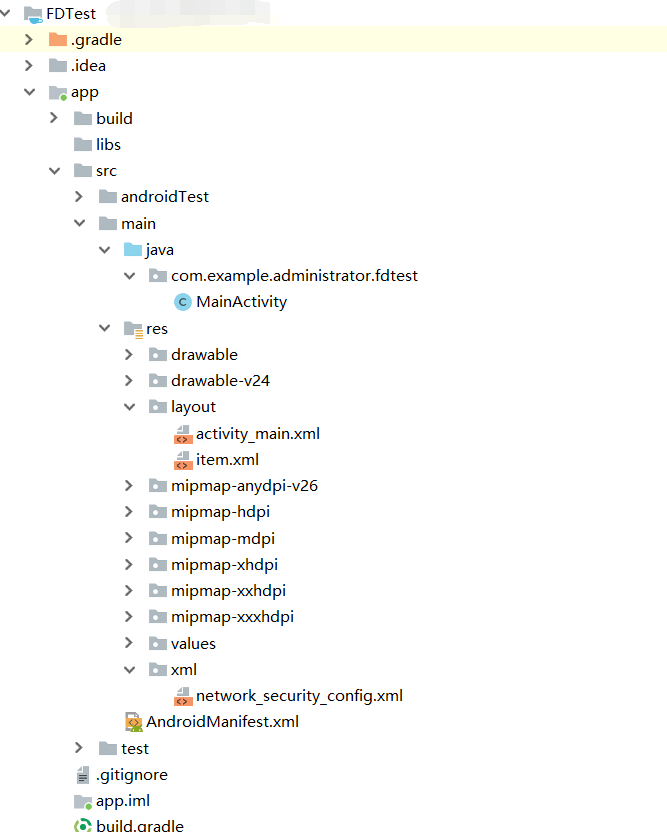Android的斷點續傳的下載線上檔案示例
阿新 • • 發佈:2019-01-01
Android的斷點續傳的下載線上檔案示例
檔案的結構如下:

activity_main.xml:
<LinearLayout xmlns:android="http://schemas.android.com/apk/res/android" xmlns:tools="http://schemas.android.com/tools" android:layout_width="match_parent" android:layout_height="match_parent" android:orientation="vertical" tools:context=".MainActivity" > <EditText android:id="@+id/et_path" android:layout_width="match_parent" android:layout_height="wrap_content" android:text="http://192.168.159.1:8080/gh.zip" android:hint="請輸入下載路徑" tools:ignore="HardcodedText" /> <EditText android:id="@+id/et_threadCount" android:layout_width="match_parent" android:layout_height="wrap_content" android:hint="請輸入執行緒的數量" /> <Button android:layout_width="wrap_content" android:layout_height="wrap_content" android:onClick="click" android:text="下載" /> <LinearLayout android:id="@+id/ll_pb" android:layout_width="match_parent" android:layout_height="match_parent" android:orientation="vertical" > </LinearLayout> </LinearLayout>
item.xml:
<?xml version="1.0" encoding="utf-8"?>
<ProgressBar xmlns:android="http://schemas.android.com/apk/res/android"
android:id="@+id/progressBar1"
style="?android:attr/progressBarStyleHorizontal"
android:layout_width="match_parent"
android:layout_height="wrap_content" />
network_security_config.xml:
<?xml version="1.0" encoding="utf-8"?>
<network-security-config>
<base-config cleartextTrafficPermitted="true" />
</network-security-config>AndroidManifest.xml:
<?xml version="1.0" encoding="utf-8"?> <manifest xmlns:android="http://schemas.android.com/apk/res/android" package="com.example.administrator.fdtest"> <uses-permission android:name="android.permission.INTERNET"></uses-permission> <uses-permission android:name="android.permission.READ_EXTERNAL_STORAGE"></uses-permission> <uses-permission android:name="android.permission.WRITE_EXTERNAL_STORAGE"/> <application android:usesCleartextTraffic="true" android:networkSecurityConfig="@xml/network_security_config" android:allowBackup="true" android:icon="@mipmap/ic_launcher" android:label="@string/app_name" android:roundIcon="@mipmap/ic_launcher_round" android:supportsRtl="true" android:theme="@style/AppTheme"> <activity android:name=".MainActivity"> <intent-filter> <action android:name="android.intent.action.MAIN" /> <category android:name="android.intent.category.LAUNCHER" /> </intent-filter> </activity> </application> </manifest>
MainActivity:
package com.example.administrator.fdtest;
import java.io.BufferedReader;
import java.io.File;
import java.io.FileInputStream;
import java.io.InputStream;
import java.io.InputStreamReader;
import java.io.RandomAccessFile;
import java.net.HttpURLConnection;
import java.net.URL;
import java.util.ArrayList;
import java.util.List;
import android.Manifest;
import android.content.pm.PackageManager;
import android.os.Bundle;
import android.os.Environment;
import android.app.Activity;
import android.support.v4.app.ActivityCompat;
import android.view.Menu;
import android.view.View;
import android.widget.EditText;
import android.widget.LinearLayout;
import android.widget.ProgressBar;
public class MainActivity extends Activity {
private EditText et_path;
private EditText et_threadCount;
private LinearLayout ll_pb_layout;
private String path;
private static int runningThread; //代表當前正在執行的執行緒
private int threadCount;
private List<ProgressBar> pbLists; //用來存進度條的引用
private final int REQUEST_EXTERNAL_STORAGE = 1;
private String[] PERMISSIONS_STORAGE = {
Manifest.permission.READ_EXTERNAL_STORAGE,
Manifest.permission.WRITE_EXTERNAL_STORAGE };
public void verifyStoragePermissions(Activity activity) {
// Check if we have write permission
int permission = ActivityCompat.checkSelfPermission(activity,
Manifest.permission.WRITE_EXTERNAL_STORAGE);
if (permission != PackageManager.PERMISSION_GRANTED) {
// We don't have permission so prompt the user
ActivityCompat.requestPermissions(activity, PERMISSIONS_STORAGE,
REQUEST_EXTERNAL_STORAGE);
}
}
@Override
protected void onCreate(Bundle savedInstanceState) {
super.onCreate(savedInstanceState);
setContentView(R.layout.activity_main);
verifyStoragePermissions(this);
// [1]找到我們關心的控制元件
et_path = (EditText) findViewById(R.id.et_path);
et_threadCount = (EditText) findViewById(R.id.et_threadCount);
ll_pb_layout = (LinearLayout) findViewById(R.id.ll_pb);
//[2]新增一個集合 用來存進度條的引用
pbLists = new ArrayList<ProgressBar>();
}
//點選按鈕實現下載的邏輯
public void click(View v){
//[2]獲取下載的路徑
// path = et_path.getText().toString().trim();
path = "http://192.168.159.1:8080/gh.zip";
//[3]獲取執行緒的數量
String threadCountt = et_threadCount.getText().toString().trim();
//[3.0]先移除進度條 在新增
ll_pb_layout.removeAllViews();
threadCount = Integer.parseInt(threadCountt);
pbLists.clear();
for (int i = 0; i < threadCount; i++) {
//[3.1]把我定義的item佈局轉換成一個view物件
ProgressBar pbView = (ProgressBar) View.inflate(getApplicationContext(), R.layout.item, null);
//[3.2]把pbView 新增到集合中
pbLists.add(pbView);
//[4]動態的新增進度條
ll_pb_layout.addView(pbView);
}
//[5]開始移植 聯網 獲取檔案長度
new Thread(){public void run() {
//[一 ☆☆☆☆]獲取伺服器檔案的大小 要計算每個執行緒下載的開始位置和結束位置
try {
//(1) 建立一個url物件 引數就是網址
URL url = new URL(path);
//(2)獲取HttpURLConnection 連結物件
HttpURLConnection conn = (HttpURLConnection) url.openConnection();
//(3)設定引數 傳送get請求
conn.setRequestMethod("GET"); //預設請求 就是get 要大寫
//(4)設定連結網路的超時時間
conn.setConnectTimeout(5000);
//(5)獲取伺服器返回的狀態碼
int code = conn.getResponseCode(); //200 代表獲取伺服器資源全部成功 206請求部分資源
if (code == 200) {
//(6)獲取伺服器檔案的大小
int length = conn.getContentLength();
//[6.1]把執行緒的數量賦值給正在執行的執行緒
runningThread = threadCount;
System.out.println("length:"+length);
//[二☆☆☆☆ ] 建立一個大小和伺服器一模一樣的檔案 目的提前把空間申請出來
RandomAccessFile rafAccessFile = new RandomAccessFile(getFilename(path), "rw");
rafAccessFile.setLength(length);
//(7)算出每個執行緒下載的大小
int blockSize = length /threadCount;
//[三☆☆☆☆ 計算每個執行緒下載的開始位置和結束位置 ]
for (int i = 0; i < threadCount; i++) {
int startIndex = i * blockSize; //每個執行緒下載的開始位置
int endIndex = (i+1)*blockSize - 1;
//特殊情況 就是最後一個執行緒
if (i == threadCount - 1) {
//說明是最後一個執行緒
endIndex = length - 1;
}
System.out.println("執行緒id:::"+i + "理論下載的位置"+":"+startIndex+"-----"+endIndex);
//四 開啟執行緒去伺服器下載檔案
DownLoadThread downLoadThread = new DownLoadThread(startIndex, endIndex, i);
downLoadThread.start();
}
}
} catch (Exception e) {
e.printStackTrace();
}
};}.start();
}
//定義執行緒去伺服器下載檔案
private class DownLoadThread extends Thread{
//通過構造方法把每個執行緒下載的開始位置和結束位置傳遞進來
private int startIndex;
private int endIndex;
private int threadId;
private int PbMaxSize; //代表當前執行緒下載的最大值
//如果中斷過 獲取上次下載的位置
private int pblastPostion;
public DownLoadThread(int startIndex,int endIndex,int threadId){
this.startIndex = startIndex;
this.endIndex = endIndex;
this.threadId = threadId;
}
@Override
public void run() {
//四 實現去伺服器下載檔案的邏輯
try {
//(0)計算當前進度條的最大值
PbMaxSize = endIndex - startIndex;
//(1) 建立一個url物件 引數就是網址
URL url = new URL(path);
//(2)獲取HttpURLConnection 連結物件
HttpURLConnection conn = (HttpURLConnection) url
.openConnection();
//(3)設定引數 傳送get請求
conn.setRequestMethod("GET"); //預設請求 就是get 要大寫
//(4)設定連結網路的超時時間
conn.setConnectTimeout(5000);
//[4.0]如果中間斷過 繼續上次的位置 繼續下載 從檔案中讀取上次下載的位置
File file =new File(getFilename(path)+threadId+".txt");
if (file.exists() && file.length()>0) {
FileInputStream fis = new FileInputStream(file);
BufferedReader bufr = new BufferedReader(new InputStreamReader(fis));
String lastPositionn = bufr.readLine(); //讀取出來的內容就是上一次下載的位置
int lastPosition = Integer.parseInt(lastPositionn);
//[4.0]給我們定義的進度條條位置 賦值
pblastPostion = lastPosition - startIndex;
//[4.0.1]要改變一下 startIndex 位置
startIndex = lastPosition + 1;
System.out.println("執行緒id::"+threadId + "真實下載的位置"+":"+startIndex+"-----"+endIndex);
fis.close(); //關閉流
}
//[4.1]設定一個請求頭Range (作用告訴伺服器每個執行緒下載的開始位置和結束位置)
conn.setRequestProperty("Range", "bytes="+startIndex+"-"+endIndex);
//(5)獲取伺服器返回的狀態碼
int code = conn.getResponseCode(); //200 代表獲取伺服器資源全部成功 206請求部分資源 成功
if (code == 206) {
//[6]建立隨機讀寫檔案物件
RandomAccessFile raf = new RandomAccessFile(getFilename(path), "rw");
//[6]每個執行緒要從自己的位置開始寫
raf.seek(startIndex);
InputStream in = conn.getInputStream(); //存的是feiq.exe
//[7]把資料寫到檔案中
int len = -1;
byte[] buffer = new byte[1024*1024];//1Mb
int total = 0; //代表當前執行緒下載的大小
while((len = in.read(buffer))!=-1){
raf.write(buffer, 0, len);
total +=len;
//[8]實現斷點續傳 就是把當前執行緒下載的位置 給存起來 下次再下載的時候 就是按照上次下載的位置繼續下載 就可以了
int currentThreadPosition = startIndex + total; //比如就存到一個普通的.txt文字中
//[9]用來存當前執行緒下載的位置
RandomAccessFile raff = new RandomAccessFile(getFilename(path)+threadId+".txt", "rwd");
raff.write(String.valueOf(currentThreadPosition).getBytes());
raff.close();
//[10]設定一下當前進度條的最大值 和 當前進度
pbLists.get(threadId).setMax(PbMaxSize);//設定進度條的最大值
pbLists.get(threadId).setProgress(pblastPostion+total);//設定當前進度條的當前進度
}
raf.close();//關閉流 釋放資源
System.out.println("執行緒id:"+threadId + "---下載完畢了");
//[10]把.txt檔案刪除 每個執行緒具體什麼時候下載完畢了 我們不知道
synchronized (DownLoadThread.class) {
runningThread--;
if (runningThread == 0) {
//說明所有的執行緒都執行完畢了 就把.txt檔案刪除
for (int i = 0; i < threadCount; i++) {
File delteFile = new File(getFilename(path)+i+".txt");
delteFile.delete();
}
}
}
}
} catch (Exception e) {
e.printStackTrace();
}
}
}
//獲取檔案的名字 "http://192.168.11.73:8080/feiq.exe";
public String getFilename(String path){
int start = path.lastIndexOf("/")+1;
String substring = path.substring(start);
String fileName = Environment.getExternalStorageDirectory().getPath()+"/"+substring;
return fileName;
}
}